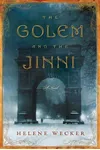Picture a storyteller who weaves Jewish folklore and Syrian mythology into the bustling streets of 19th-century New York—meet Helene Wecker! This American author burst onto the literary scene with her debut novel, The Golem and the Jinni, a dazzling blend of historical fiction, fantasy, and magical realism that captures the immigrant experience through a mythical lens. Inspired by her Jewish heritage and her Syrian American husband’s background, Wecker crafts enchanting tales that explore identity, belonging, and the human condition.
The Making of Helene Wecker
Born in Libertyville, Illinois, Helene Wecker grew up with a passion for storytelling. She earned a B.A. in English from Carleton College in Minnesota, but her early career took her into the corporate world, working in marketing and communications in Minneapolis and Seattle. The urge to write never faded, and after seven years, she took a leap of faith, enrolling in Columbia University’s MFA program in Fiction Writing. There, Wecker began exploring her Jewish roots and her husband’s Syrian American heritage, laying the foundation for her unique narrative style.
Helene Wecker’s Unforgettable Stories
Wecker’s debut, The Golem and the Jinni (2013), is a masterpiece of historical fantasy. Set in 1899 New York, it follows Chava, a golem made of clay, and Ahmad, a jinni trapped in human form, as they navigate the immigrant neighborhoods of the Lower East Side and Little Syria. The novel’s meticulous research and vivid portrayal of Jewish and Syrian communities earned it the Mythopoeic Award, VCU Cabell Award, and Harold U. Ribalow Prize, with nominations for Nebula and World Fantasy Awards. Its sequel, The Hidden Palace (2021), continues the saga into the early 20th century, deepening the emotional and mystical stakes. Wecker’s short stories have also appeared in Joyland, Catamaran, and the anthology The Djinn Falls in Love and Other Stories. Her writing style seamlessly blends gritty historical detail with fantastical elements, creating a magical realism that feels both timeless and intimate.
At the heart of Wecker’s work are themes of identity and assimilation. Her characters, often outsiders like Chava and Ahmad, grapple with their dual natures—human and supernatural—mirroring the struggles of immigrants caught between old and new worlds. Wecker’s ability to humanize mythical beings while grounding them in a richly detailed historical setting has drawn comparisons to fantasy giants like Tolkien and Susanna Clarke.
Why Helene Wecker Matters
Helene Wecker’s work resonates because it bridges cultures and genres, offering a fresh perspective on the immigrant experience. By blending Jewish and Arab folklore, she celebrates the shared humanity of diverse communities, a reflection of her own intercultural marriage. Her novels have captivated readers and critics alike, earning a place on bestseller lists and in the hearts of historical fantasy fans. Wecker’s storytelling invites us to explore what it means to be human, making her a vital voice in modern literature.
- Born: Libertyville, Illinois
- Key Works: The Golem and the Jinni (2013), The Hidden Palace (2021)
- Awards: Mythopoeic Award, VCU Cabell Award, Harold U. Ribalow Prize
- Education: B.A. from Carleton College, MFA from Columbia University
Snag The Golem and the Jinni and dive into Helene Wecker’s spellbinding world of historical fantasy and magical realism!


